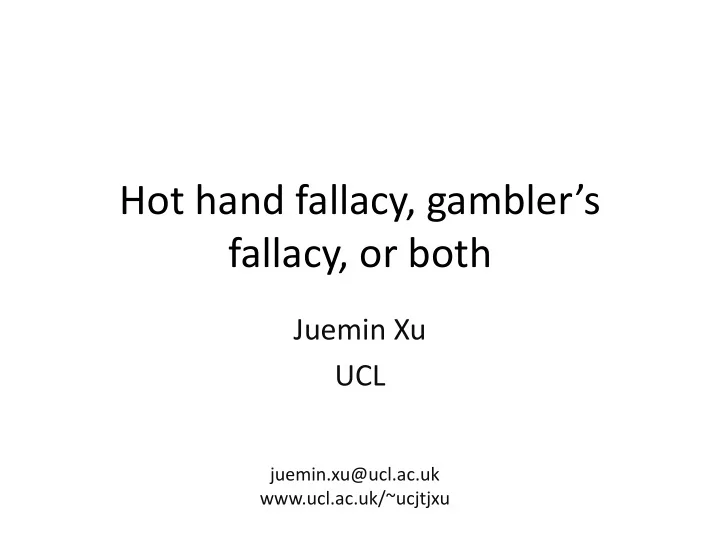

Hot hand fallacy, gambler’s fallacy, or both Juemin Xu UCL juemin.xu@ucl.ac.uk www.ucl.ac.uk/~ucjtjxu
Luck to continue or to turn • Hot hand fallacy • Gambler’s fallacy • “No 5 has won the last • “No 5 has won the last five spins, it’s on the lucky five spins, it has got it’s streak! I should bet on it! fair share. I should bet on And bet more!” another number now.” Will you bet on No 5 or not? juemin.xu@ucl.ac.uk
When I am the one winning • Hot hand fallacy • Gambler’s fallacy • “I have won the last five • “I have won the last five spins, I’m on the lucky spins, I have got my fair streak! I should bet share. I should stop more!” now.” How will you bet? juemin.xu@ucl.ac.uk
Data structure Type Game Time Bet Bet type Odd Result Amount Horse 26/03/ Racing 3m1f 2010 5 Back 2.82 WON 9.1 juemin.xu@ucl.ac.uk
Data structure • All bets of over 1000 people in one year. • 1.8m bets in total, 1.1m in GBP, .5 m in EUR. • Among GBP users: Medium bet: £6, Mean £65.9. • Bets placed by one user in 2010: Medium 244 times, Mean 1106 times. • Horse racing is the most popular game. juemin.xu@ucl.ac.uk
Graph 1. Horse racing, GBP. Black circles for losses, red triangles for wins. The unit is the gambler’s average bet size. Straight lines are the prediction lines, given the previous win or loss. On both winning and losing, the flatter lines are the ones including extreme data points, the steeper lines are the ones excluding extreme points. juemin.xu@ucl.ac.uk
Possible explanations • Select the fallacy that suits you? • Mismatch of reward and anxiety? • ? ? ? juemin.xu@ucl.ac.uk
Recommend
More recommend